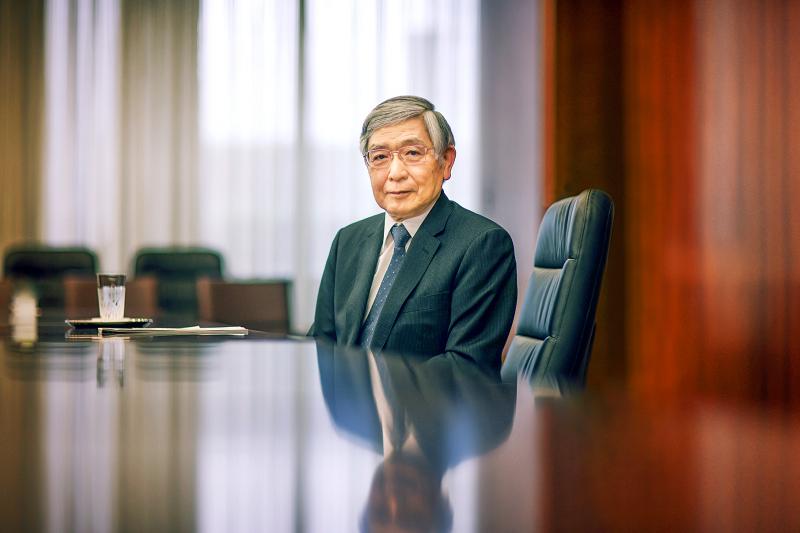The Bank of Japan will consider climate change in its monetary policy discussions, Governor Haruhiko Kuroda said on Thursday.
“We have a great interest” in climate change, and its impact on the economy and the financial system, Kuroda said in an interview. “Naturally, how we respond to this at the level of monetary policy will become a topic of discussion.”
The comments come amid growing debate among central bankers over whether or how they should support efforts to counter climate change, following a series of pledges by governments, including the US, China and Japan, to reduce greenhouse emissions.

Photo: Bloomberg
Touching on another key theme among investors, Kuroda said that global inflation concerns were most relevant in the US.
US Federal Reserve Chair Jerome Powell has said that some temporary inflation pressures will prove transitory and stimulus should stay in place for longer.
“That policy stance is based on the recognition that it will take time to overcome low inflation once it is entrenched,” Kuroda said. “That is the lesson learned from Japan’s experience of prolonged deflation.”
Until now, Kuroda has largely stuck to the view that the Bank of Japan needs to consider climate change from the perspective of how it might present a risk to the financial system, a stance similar to Powell’s.
While his latest remarks suggest he might be moving in the direction of European Central Bank President Christine Lagarde or Bank of England Governor Andrew Bailey, who have shown a more aggressive stance on green issues, it remains to be seen what action the Bank of Japan will take.
“While there are discussions about whether central banks should be buying green bonds, many of those discussions are over asset management, not monetary policy,” Kuroda said, when asked whether Japan’s central bank would consider purchasing green bonds as a response to climate change.
Targeting green bonds is an approach Lagarde has had difficulty moving forward. Kuroda did not rule out using new loan incentives that the bank launched in March.
Kuroda, Powell, Bailey and Lagarde are to be among those discussing ways to promote green financing measures at next week’s Green Swan Conference organized by the Bank for International Settlements, the IMF and others.
Interest is growing in how the Bank of Japan might support the nation’s pledge last month to reduce emissions by 46 percent by 2030 on its way to becoming carbon neutral by 2050.
Eighty-three percent of economists surveyed by Bloomberg last month said that the Bank of Japan will end up using its new lending incentives to promote environmental, social and corporate governance, or higher growth policies.
The incentives essentially pay commercial banks different interest rates on their reserves depending on the type of lending they provide for businesses.
The incentives were intended to give the bank more scope for lowering its policy rate, not as a possible tool for responding to climate change, Kuroda said.
However, they could be adapted, he said.
As for inflation and signs that the tide of central banks is starting to signal a move away from the emergency policy measures of the COVID-19 pandemic, Kuroda once again underlined that the Bank of Japan would keep its stimulus rolling.
“Each central bank has to adapt its monetary policy to its own economy, price and financial situations,” Kuroda said. “Our inflation rate is still quite low and so we have to be persistent in conducting our monetary easing to achieve our 2 percent price stability target.”

Intel Corp chief executive officer Lip-Bu Tan (陳立武) is expected to meet with Taiwanese suppliers next month in conjunction with the opening of the Computex Taipei trade show, supply chain sources said on Monday. The visit, the first for Tan to Taiwan since assuming his new post last month, would be aimed at enhancing Intel’s ties with suppliers in Taiwan as he attempts to help turn around the struggling US chipmaker, the sources said. Tan is to hold a banquet to celebrate Intel’s 40-year presence in Taiwan before Computex opens on May 20 and invite dozens of Taiwanese suppliers to exchange views

Application-specific integrated circuit designer Faraday Technology Corp (智原) yesterday said that although revenue this quarter would decline 30 percent from last quarter, it retained its full-year forecast of revenue growth of 100 percent. The company attributed the quarterly drop to a slowdown in customers’ production of chips using Faraday’s advanced packaging technology. The company is still confident about its revenue growth this year, given its strong “design-win” — or the projects it won to help customers design their chips, Faraday president Steve Wang (王國雍) told an online earnings conference. “The design-win this year is better than we expected. We believe we will win

Chizuko Kimura has become the first female sushi chef in the world to win a Michelin star, fulfilling a promise she made to her dying husband to continue his legacy. The 54-year-old Japanese chef regained the Michelin star her late husband, Shunei Kimura, won three years ago for their Sushi Shunei restaurant in Paris. For Shunei Kimura, the star was a dream come true. However, the joy was short-lived. He died from cancer just three months later in June 2022. He was 65. The following year, the restaurant in the heart of Montmartre lost its star rating. Chizuko Kimura insisted that the new star is still down

While China’s leaders use their economic and political might to fight US President Donald Trump’s trade war “to the end,” its army of social media soldiers are embarking on a more humorous campaign online. Trump’s tariff blitz has seen Washington and Beijing impose eye-watering duties on imports from the other, fanning a standoff between the economic superpowers that has sparked global recession fears and sent markets into a tailspin. Trump says his policy is a response to years of being “ripped off” by other countries and aims to bring manufacturing to the US, forcing companies to employ US workers. However, China’s online warriors